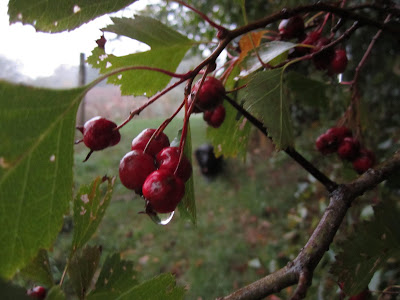sunrise: 6:26
NOTE TO REGULAR READERS:
The next three days' posts may appear late by a few hours, or a few days, due to some off the grid travel. I will still be walking, writing, and taking pictures at dawn every day, and should be able to transfer everything onto a computer by Tuesday night.
Today I want to talk about the brain. This astounding entity could consume a lifetime of wonder for scientist, philosopher or poet - or anyone. I suppose it does already.
First of all - spiders. I am further educated about spiders and their webs, and must now retract my grand ideas about spiders leaving for the winter season on some communal command. It sounded poetic, but turned out to be silly. An Audubon naturalist friend and an entomologist cousin straightened me out.
Many spiders, as I mentioned yesterday, eat their webs at the end of the day. Or the webs break down very quickly if not maintained. Webs are a daily and a constant routine, not a lasting artwork. The weather on a particular day may discourage web building. "Check again tomorrow," said Holly. Sure enough, there were webs back in the field today.
But what an instinct, what a program! and it is performed by such a tiny brain. Here is what I learned about spider brains, thanks to the HowStuffWorks website:
********
Spider Brain
One of the most amazing things about spiders is how much they can accomplish with such a small brain. The spider's central nervous system is made up of two relatively simple ganglia, or nerve cell clusters, connected to nerves leading to the spider's various muscles and sensory systems. The simple instructions encoded in these nerve cells give spiders all the information they need to undertake complex tasks, such as building webs and attacking prey. Some species even exhibit learning behavior. If something isn't working -- a web in a particular spot, for example -- the spider will give up the activity and try something new.
*********
Now we'll jump to dogs. Very complex relative to spiders, but the level at which they are so powerfully instinct driven is fascinating to me. Clara flushed another white-tailed deer out of the bracken and across the meadow this morning. She paces her learned boundary vigilantly, searching for a way to pursue.
Kate breaks her fetching instinct only briefly to pursue the deer. Fetching has become her dominant program. It is like a drug, an irresistible addiction.
Having lost a stick through deer distraction, she plunges headlong into the trees to find a replacement. When I inadvertently lost her replacement stick in a tree, she settled on an apple. Any way she can, she is at the ready.
Finally - the human brain. One of my best friends from college saw his wife bowled over by a stroke just a few weeks ago. It affected the left side of her brain, so she lost the use of the right side of her body, in addition to losing the ability to communicate. They stabilized the bleed in her brain, though the origin is still somewhat of a mystery.
The long haul now is the weeks, months, perhaps years of physical, occupational, and speech therapy that she will go through to see how much function she can recover.
She is beginning to be able to move on her own a bit, and "walks" with help.
Yesterday she spoke her first clear word, and it was in the context of singing nursery rhymes. Since speech comes from the left brain, and singing comes from the right, it is possible to find language through singing even if you can't find it in plain speaking. Within a day, working with her speech therapist, she was learning how to speak again, painstakingly, exhaustingly, and with great concentration - by thinking of it as a song.
The joy in her and in her family was beautifully portrayed in an on line journal, and I was literally weeping at the computer when I read it this morning. Who knows how far she will be able to come, and how long the progress will continue, but in the moment of the day there is great celebration.
Amazing. And this time, not silly at all.
Saturday, September 25, 2010
Subscribe to:
Post Comments (Atom)










The story about your friend's wife reminds me of the Diving Bell and the Butterfly.
ReplyDelete